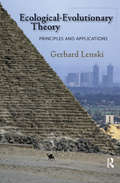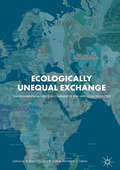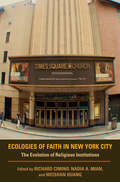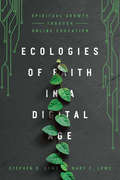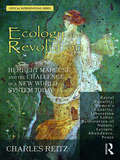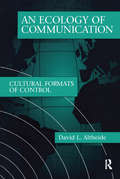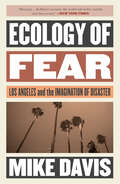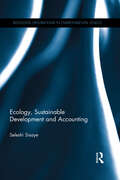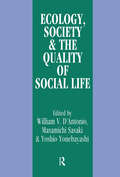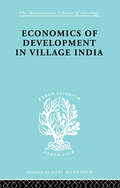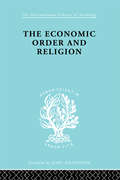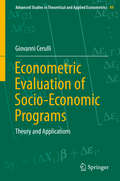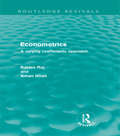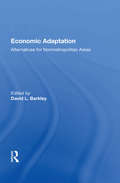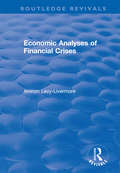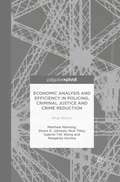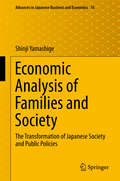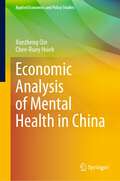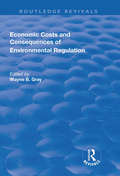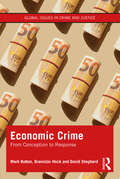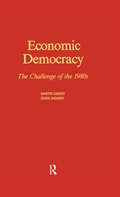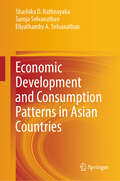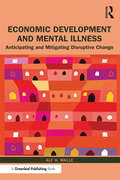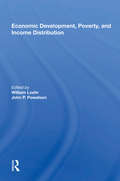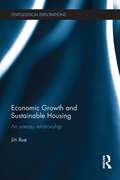- Table View
- List View
Ecological-Evolutionary Theory: Principles and Applications
by Gerhard LenskiFor forty years, in a variety of books and articles, Gerhard Lenski has become the most influential proponent of ecological and evolutionary explanations of human societies, their development and transformations, from the Stone Age to the present. In his newest book, Lenski offers a succinct but comprehensive statement of the full body of his theory followed by demonstration of how it can be used to generate new and valuable insights when applied to a set of highly diverse issues. These include debates concerning the origin of ancient Israel and its distinctive culture, the rise of the West in the modern era, the highly varied trajectories of development of Third World nations in recent decades, and the failure of Marxist efforts to transform society in the Soviet Union and elsewhere. In the concluding chapter, Lenski discusses a number of other issues and areas where ecological-evolutionary theory may be fruitfully applied in the future.
Ecologically Unequal Exchange: Environmental Injustice in Comparative and Historical Perspective
by Harry F. Dahms R. Scott Frey Paul K. GellertAt a time of societal urgency surrounding ecological crises from depleted fisheries to mineral extraction and potential pathways towards environmental and ecological justice, this book re-examines ecologically unequal exchange (EUE) from a historical and comparative perspective. The theory of ecologically unequal exchange posits that core or northern consumption and capital accumulation is based on peripheral or southern environmental degradation and extraction. In other words, structures of social and environmental inequality between the Global North and Global South are founded in the extraction of materials from, as well as displacement of waste to, the South. This volume represents a set of tightly interlinked papers with the aim to assess ecologically unequal exchange and to move it forward. Chapters are organised into three main sections: theoretical foundations and critical reflections on ecologically unequal exchange; empirical research on mining, deforestation, fisheries, and the like; and strategies for responding to the adverse consequences associated with unequal ecological exchange. Scholars as well as advanced undergraduate and graduate students will benefit from the spirited re-evaluation and extension of ecologically unequal exchange theory, research, and praxis.
Ecologies of Faith in New York City: The Evolution of Religious Institutions
by Weishan Huang Nadia A. Mian Richard Cimino“A great resource for students in congregational, religious, and urban studies . . . a valuable installment in the resurrection of urban religious ecology.”—Omar McRoberts, University of ChicagoEcologies of Faith in New York City examines patterns of interreligious cooperation and conflict in New York City. It explores how representative congregations in this religiously diverse city interact with their surroundings by competing for members, seeking out niches, or cooperating via coalitions and neighborhood organizations. Based on in-depth research in New York’s ethnically mixed and rapidly changing neighborhoods, the essays in the volume describe how religious institutions shape and are shaped by their environments, what new roles they have assumed, and how they relate to other religious groups in the community.“The book deals with important issues in important ways. New York City is a veritable center of the phenomena being studied.” —Jay Demerath, University of Massachusetts“A valuable contribution to the growing field of congregational studies that places congregations and their agency on the table as one important element to understanding the changing American metropolis.” —Journal of Urban Affairs“An excellent example of religious scholarship.” —Review of Religious Research“Offers nine essays focusing on religious institutions of New York City as they have been impacted by the social dynamics of gentrification, immigration, and entrepreneurial innovation . . . Recommended.” ?Choice“A solid resource for addressing entanglements of religion and urbanism. The case studies have significant richness.” —Critical Research on Religion“A well-developed collection of essays that does an effective job of exploring the breadth of the ecological interaction between religious institutions and their environments in New York City.” ?Sociology of Religion
Ecologies of Faith: Spiritual Growth through Online Education
by Stephen D. Lowe Mary E. LoweMany Christian institutions have embraced new technologies, especially online education. But is it possible for us to grow spiritually through our digital communities? Steve Lowe and Mary Lowe, longtime proponents of online education, trace the motif of spiritual growth through Scripture and consider how students and professors alike might foster digital ecologies in which spiritual transformation can take place.
Ecology and Revolution: Herbert Marcuse and the Challenge of a New World System Today (Critical Interventions)
by Charles ReitzA timely addition to Henry Giroux’s Critical Interventions series, Ecology and Revolution is grounded in the Frankfurt School critical theory of Herbert Marcuse. Its task is to understand the economic architecture of wealth extraction that undergirds today’s intensifying inequalities of class, race, and gender, within a revolutionary ecological frame. Relying on newly discovered texts from the Frankfurt Marcuse Archive, this book builds theory and practice for an alternate world system. Ecology and radical political economy, as critical forms of systems analysis, show that an alternative world system is essential – both possible and feasible – despite political forces against it. Our rights to a commonwealth economy, politics, and culture reside in our commonworks as we express ourselves as artisans of the common good. It is in this context, that Charles Reitz develops a GreenCommonWealth Counter-Offensive, a strategy for revolutionary ecological liberation with core features of racial equality, women’s equality, liberation of labor, restoration of nature, leisure, abundance, and peace.
Ecology of Communication
by David L. AltheideAltheide's new book advances the argument set in motion some years ago with Media Logic and continued in Media Worlds in the Postjournalism Era: that in our age, information technology and the communication enviroments it posits have affected the private and the social spheres of all our power relationships, redefining the ground rules for social life and concepts such as freedom and justice., Articulated through an interactionist and non-deterministic focus, An Ecology of Communication offers a distinctive perspective for understanding the impact of information technology, communication formats, and social activities in the new electronic environment.
Ecology of Fear: Los Angeles and the Imagination of Disaster
by Mike DavisA witty and engrossing look at Los Angeles' urban ecology and the city's place in America's cultural fantasiesEarthquakes. Wildfires. Floods. Drought. Tornadoes. Snakes in the sea, mountain lions, and a plague of bees. In this controversial tour de force of scholarship, unsparing vision, and inspired writing, Mike Davis, the author of City of Quartz, revisits Los Angeles as a Book of the Apocalypse theme park. By brilliantly juxtaposing L.A.'s fragile natural ecology with its disastrous environmental and social history, he compellingly shows a city deliberately put in harm's way by land developers, builders, and politicians, even as the incalculable toll of inevitable future catastrophe continues to accumulate.Counterpointing L.A.'s central role in America's fantasy life--the city has been destroyed no less than 138 times in novels and films since 1909--with its wanton denial of its own real history, Davis creates a revelatory kaleidoscope of American fact, imagery, and sensibility. Drawing upon a vast array of sources, Ecology of Fear meticulously captures the nation's violent malaise and desperate social unease at the millennial end of "the American century." With savagely entertaining wit and compassionate rage, this book conducts a devastating reconnaissance of our all-too-likely urban future.
Ecology, Sustainable Development and Accounting (Routledge Explorations in Environmental Studies)
by Seleshi SisayeAccounting literature has viewed sustainability in terms of social, economic and environmental performances. There have been concerns that the relationship between sustainability, accounting and organizational performance cannot be explained unless we can deduce patterns of administrative behaviour that chronicle management practices. Ecology, Sustainable Development and Accounting argues that, despite the broader social and economic development dimensions of sustainability and the limitations of its extension to corporate and organizational behaviour; an ecological framework is capable of providing the overall societal and community chronologies that describe corporate sustainable operations. Drawing examples from international development and federal government organizations, this book documents the link between ecology, corporate sustainable development, and sustainability accounting and reporting. It draws together the literature from several disciplines to elaborate the contribution of the ecological approach to sustainable development in the accounting literature. This book will be of particular interest to students, academics and practitioners in the areas of environmental studies, ecological economics, sustainable development studies, and social and environmental accounting. The sociological and anthropological perspectives make this book the first of its kind to apply the population ecology of sociology to both the sustainability and accounting literature.
Ecology, World Resources and the Quality of Social Life
by William V. D'Antonio Masamichi Sasaki Yoshio YonebayashiThe twelve contributors to this volume, from ten different nations, are world-renowned sociologists who examine problems of ecology and world resources as they affect the quality of social life. Three different perspectives are employed: high technology, industrialization, and the problems of development; restructuring and alternatives of developme
Econ Dev Village India Ils 59
by M. R. HaswellFirst published in 1998. Routledge is an imprint of Taylor & Francis, an informa company.
Econ Order & Religion Ils 76 (International Library of Sociology)
by Frank Knight Thornton W. MerriamFirst Published in 1998. Routledge is an imprint of Taylor & Francis, an informa company.
Econometric Evaluation of Socio-Economic Programs
by Giovanni CerulliThis book provides advanced theoretical and applied tools for the implementation of modern micro-econometric techniques in evidence-based program evaluation for the social sciences. The author presents a comprehensive toolbox for designing rigorous and effective ex-post program evaluation using the statistical software package Stata. For each method, a statistical presentation is developed, followed by a practical estimation of the treatment effects. By using both real and simulated data, readers will become familiar with evaluation techniques, such as regression-adjustment, matching, difference-in-differences, instrumental-variables and regression-discontinuity-design and are given practical guidelines for selecting and applying suitable methods for specific policy contexts.
Econometrics: A Varying Coefficents Approach (Advanced Texts In Econometrics Ser.)
by Baldev Raj Aman UllahOriginally published in 1981, this book considers one particular area of econometrics- the linear model- where significant recent advances have been made. It considers both single and multiequation models with varying co-efficients, explains the various theories and techniques connected with these and goes on to describe the various applications of the models. Whilst the detailed explanation of the models will interest primarily econometrics specialists, the implications of the advances outlined and the applications of the models will intrest a wide range of economists.
Economic Adaptation: Alternatives For Nonmetropolitan Areas
by David L BarkleyThis volume focuses on alternatives for non-metropolitan economic development in the new international economic climate. It provides critical reviews of popular employment-generation alternatives for rural areas.
Economic Analyses of Financial Crises (Routledge Revivals)
by Amnon Levy-LivermorePublished in 1995, this set of 13 essays on the causes and implications of financial problems in three different economic organizations - corporate, semi-co-operative and non-co-operative farming communities and sovereign states. Areas covered include insolvency and bankruptcy, and risk-sharing/spreading behaviour.
Economic Analysis and Efficiency in Policing, Criminal Justice and Crime Reduction: What Works?
by Shane D. Johnson Nick Tilley Matthew Manning Gabriel T.W. Wong Margarita VorsinaThis monograph explains what economic analysis is, why it is important, and forms it can take in policing and criminal justice. Costs are important in all forms of economic analysis but their collection tends to be partial and inadequate in capturing key information. A practical guide to the collection is therefore also provided.
Economic Analysis of Families and Society: The Transformation Of Japanese Society And Public Policies (Advances in Japanese Business and Economics #0)
by Shinji YamashigeThis book, based on economics andgame theory, analyzes the changes that Japan is now facing as a reflection ofchanges in Japanese families and society. The author presents a simpleframework for the structural relationship among markets, communities includingfamilies, and the state; and uses it to explain the changes that have occurredin Japanese society. Social changes have created a series of social problemssuch as population ageing, inequality, and regional disparities, which requirechanges in public policies. The book provides readers with rich informationabout the Japanese social security system, social policies and regionalpolicies by explaining why they are developed, how they are designed, and whatchallenges they face. Readers will find that the transformation of Japanesesociety is not really a special case but a fairly common one that manydeveloped countries have experienced and many developing countries are going toexperience. The book will be useful not only to those who are interested inJapanese society and public policies but also to anyone who is interested inthe transformations of families, communities, and roles of the state in amodern market economy.
Economic Analysis of Mental Health in China (Applied Economics and Policy Studies)
by Chee-Ruey Hsieh Xuezheng QinThis book uses an economic approach to analyze the socioeconomic causes and consequences of mental health disorders in China, with a special focus on mental depression. Based on a nationally representative dataset, we first investigate the prevalence and distribution of depression and depressive symptoms among China’s adult population, and then use several econometric methods to estimate the multi-dimensional disease burden of the mental disorder, such as its direct medical costs, its indirect economic costs, and its hidden costs on social trust and life satisfaction. In addition, we specifically address the socioeconomic determinants of mental health by examining how the relative and absolute economic status may determine people’s mental depression. Lastly, we propose an analytical framework to evaluate the four major hurdles that cause the treatment gaps of mental health care, and discuss the policy options to overcome such hurdles and to address the unmet mental healthcare needs in China and other developing countries. The book may facilitate our understanding on the complex determinants and implications of the rising prevalence of mental health disorders in developing countries like China. In addition to the students, teachers, and researchers in the fields of health economics and public health, the book may also be of interest to health policy makers and non-government agencies who are concerned with addressing the global mental healthcare challenges using economic policy tools.
Economic Costs and Consequences of Environmental Regulation (Routledge Revivals)
by Wayne B. GrayThis title was first published in 2002. How expensive is environmental regulation and how does it affect the economy? A proper understanding of the costs imposed by environmental regulation is important for policy-makers and others concerned with regulatory design. This book focuses on empirical studies of the impact of environmental regulation on the economy, exposing the reader to a variety of estimation methodologies and datasets that have been used in this area. Three basic sources provide information on the costs of environmental regulation: surveys; engineering studies; and econometric analysis. This text draws on all three in its investigation.
Economic Crime: From Conception to Response (Global Issues in Crime and Justice)
by Mark Button David Shepherd Branislav HockThis book is the first attempt to establish 'economic crime' as a new sub-discipline within criminology. Fraud, corruption, bribery, money laundering, price-fixing cartels and intellectual property crimes pursued typically for financial and professional gain, have devastating consequences for the prosperity of economic life. While most police forces in the UK and the USA have an ‘economic crime’ department, and many European bodies such as Europol use the term and develop strategies and structures to deal with it, it is yet to grain traction as a widely used term in the academic community. Economic Crime: From Conception to Response aims to change that and covers: definitions of the key premises of economic crime as the academic sub-discipline within criminology; an overview of the key research on each of the crimes associated with economic crime; public, private and global responses to economic crime across its different forms and sectors of the economy, both within the UK and globally. This book is an essential resource for students, academics and practitioners engaged with aspects of economic crime, as well as the related areas of financial crime, white-collar crime and crimes of the powerful.
Economic Democracy: The Challenge of the 1980's (Routledge Revivals Ser.)
by Martin Carnoy Derek ShearerThis text discusses the economic, social and political implications of redirecting labour and capital from a military-based to a post-Cold War economy.
Economic Development and Consumption Patterns in Asian Countries
by Eliyathamby A. Selvanathan Saroja Selvanathan Shashika D. RathnayakaThis book analyzes consumption patterns in Asian countries that are at different stages of economic development and highlights the similarities and disparities of consumption patterns across countries using a system-wide framework. In a departure from previous studies in the literature which mainly present only single-country analysis, this book aims to provide a comprehensive analysis of cross-country consumption patterns considering several Asian countries, using the most recent consumption expenditure data for aggregate commodity groups. In comparing consumption patterns across countries, the book use unit-free measurements such as budget shares and changes in logarithms of price and quantities, thus avoiding problems associated with exchange rate conversions. The book also analyses the dynamic behaviour in the consumption patterns of the Asian consumers. The findings of this book will be invaluable to researchers in development economics as well as policymakers in the formulation of fiscal policy or other types of economic control.
Economic Development and Mental Illness: Anticipating and Mitigating Disruptive Change
by Alf H. WalleSocial, economic, and technological changes disrupt many Indigenous, ethnic, and rural communities even when offering progress. Under these conditions, social and psychological dysfunctions are likely to emerge. This book provides insights regarding how to anticipate, prevent, and, when necessary, provide mitigation strategies to communities and individuals who suffer as a result. This book, the first of its kind, provides an overview of strategic and policy issues involving the relationship between change and dysfunction, enabling the reader to more effectively deal with potentially hurtful influences in proactive, equitable, and culturally sensitive ways. After providing a theoretical overview, methods for anticipating the hurtful impacts of change are discussed, along with techniques for mitigating its negative effects upon communities and individuals. Learning objectives and discussion questions are included with each chapter, and the book can serve as a text for courses on indigenous economic development, Native studies, culturally appropriate business, and culturally competent therapy. It can also be used as a professional handbook for practitioners working with communities affected by these issues.
Economic Development, Poverty, And Income Distribution
by John P. Powelson William LoehrThe increasing inequality and poverty that seem inevitably to accompany economic growth in developing countries have become more and more evident in recent years. The search for development paths that lead to growth with equality—all too difficult to find—is now an area of central concern for development economists. One result of their concern is this volume, in which internationally known representatives of a range of disciplines address themselves to ways in which growth with equity might be successfully achieved. The book begins with both empirical and theoretical background to the development issues involved, and with an overview of the experience of the international development assistance community. focuses on operational definitions of the poor that will permit analytical, policy-oriented research to lead to useful conclusions. Specific concern is expressed for small-business owners, women, peasants, and recent migrants from rural to urban areas. The basic question, of course, is what can be done about poverty and inequality. includes suggestions for specific measures and provides a comprehensive comparison across a wide range of policy options. The book does not solve the problem, but it does point to directions that promise a reasonably high probability of success. And throughout, suggestions are made for the kind of interdisciplinary research required to raise that probability even further.
Economic Growth and Sustainable Housing: an uneasy relationship (Ontological Explorations (routledge Critical Realism) Ser.)
by Jin XueEconomic Growth and Sustainable Housing: An Uneasy Relationship critically discusses the possibilities of decoupling environmental degradation from economic growth. The author refutes the belief in combining perpetual economic growth with long-term environmental sustainability based on the premise that economic growth can be fully decoupled from negative environmental impacts. This proposition is underpinned by intensive study in the housing sector from both theoretical and empirical perspectives. Xue employs critical realism to inform the investigation and organize the argumentation throughout the book. The book is organised into four parts: the first discusses the relevance of critical realism to the research field of housing and urban sustainable development in terms of ontology and methodology. The second makes a transcendental refutation of the possibilities of decoupling economic growth from housing-related environmental impacts by describing transfactual conditions of full decoupling. The third part presents two case studies to show whether and to what extents decoupling between economic growth and housing-related environmental impacts have historically taken place. Inspired by critical realist ontology, generalization of abstract concept from the case studies are made to cast light on the implausibility of maintaining perpetual economic growth through decoupling. The final part explains why and how the belief in full decoupling and economic growth is generated and sustained despite its implausibility and non-necessity, which constitutes an explanatory critique of the growth and decoupling ideology and paves the way for the paradigm shift to socially sustainable de-growth. This book will be of interest to students of housing and urban studies, to students of environmental sustainability and also for those students and academics with a general interest in critical realism.
